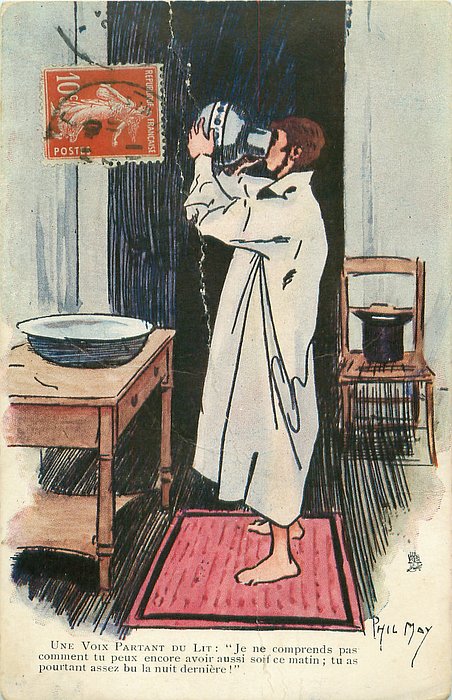
02 Oct Don’t whisper, speak up!
Pain in the back of your throat. A pocket full of cough drops. Dry, hoarse coughing. We have all felt this at one point or another in our job as interpreters. Whether we have the flu, a cold, or even laryngitis, the symptoms could point to a deeper health issue: muscle tension dysphonia. Put simply, you have strained your vocal cords.
 Muscle tension dysphonia (strained vocal cords) can happen when a person is yelling, speaking excessively, or talking in a vocal pitch that is too high. This is a common occurrence in jobs where the voice is used in excess, such as singing, acting, and teaching. Less thought of is the toll that the job of interpreting can take on our vocal cords.
Muscle tension dysphonia (strained vocal cords) can happen when a person is yelling, speaking excessively, or talking in a vocal pitch that is too high. This is a common occurrence in jobs where the voice is used in excess, such as singing, acting, and teaching. Less thought of is the toll that the job of interpreting can take on our vocal cords.
No other part of your body can accelerate up to 200 hertz as fast as your vocal cords can. Our voices have the ability to go from a whisper to a loud scream within milliseconds. As spoken-language interpreters, our voice is our job. Without our voice, we cannot function in our day-to-day tasks. Therefore, it is imperative that we take care of our voices.
What are some important steps that we as interpreters can take to prevent damage and strain to our vocal cords? For starters, we can do some simple vocal exercises before we begin work each day. The best vocal warm-up guides can be found on YouTube by a speech pathologist named Melissa Grassia Chisholm. One such video is the “Vocal Function Exercise.” Other helpful videos can be found under Dr. Joseph C. Stemple’s name, such as “The Rationale for Vocal Function Exercises.”
 Another way to keep your vocal cords safe is to stay hydrated. Having more water in your system creates thinner vocal secretions. The thinner the vocal secretions, the clearer your voice will be, and the less your vocal cords will be strained.
Another way to keep your vocal cords safe is to stay hydrated. Having more water in your system creates thinner vocal secretions. The thinner the vocal secretions, the clearer your voice will be, and the less your vocal cords will be strained.
Additionally, you can advocate for an interpreter break every 30 minutes. In some circumstances, this isn’t possible, due to our busy schedules as interpreters. Nevertheless, it has been shown that giving your voice a break at 30-minute increments will keep your voice from being overworked.
Still another option is massage therapy. If you have a massage therapist, you can request that they do massage work on your neck, throat, and vocal-cord muscles (and if you are a signed-language interpreter, that massage is still a good idea for your arms, hands, neck, and shoulders). When massage therapy is not an option, you can find videos on YouTube that teach basic laryngeal self-massages. This video from vocologist Karen Sussman titled “Laryngeal massage: de-stress your voice” has some helpful self-massaging techniques.
Another step you can take in protecting your voice is to talk to your medical-insurance provider. You can see if they provide coverage under the disability-insurance clause for your voice. If you plan to make interpreting a life-long career, then you need to make an allowance for that in your medical insurance. Your voice will get wear and tear from years of daily use, just like singers and public speakers. Therefore, it is important to see what sort of vocal injuries your medical insurance can cover.
Alternatively, you can speak to your PCP (primary-care provider) and ask them to clean your ears out. Buildup of earwax can cause blockages which can lead to hearing problems, which in turn leads to your speaking more loudly. Speaking more loudly will cause your vocal cords to become strained. Doctors recommend that a person should get their ears professionally cleaned every six months.
You can also speak to your PCP about getting certain medications to clear your throat of mucus accumulation. Medicines like guaifenesin or acetylcysteine can help to clear thick mucus from blocking your vocal cords.
Lastly, you can use warm water mixed with salt or mixed with tea to calm your vocal cords. For example, instead of clearing your throat manually, by saying “ahem” or forcefully coughing, you should gargle salt water. Warm salt water can soothe your vocal cords and break up any phlegm or mucus buildup in your throat.
 Another good vocal habit is to drink tea daily. Teas such as chamomile, ginger, and peppermint are good for soothing your vocal cords. However, make sure that the water you use for steeping your tea isn’t too hot or too cold. Room temperature water is the best because extreme temperatures can cause damage to the vocal cords.
Another good vocal habit is to drink tea daily. Teas such as chamomile, ginger, and peppermint are good for soothing your vocal cords. However, make sure that the water you use for steeping your tea isn’t too hot or too cold. Room temperature water is the best because extreme temperatures can cause damage to the vocal cords.
If you are a spoken-language interpreter, your voice is your moneymaker. Your voice is your identity; without it, your job would cease to exist. So, we must protect our voices, lest we lose them in the cacophony that we face every day as interpreters. In the wise words of the English singer-songwriter Adele, “The voice is a muscle, and it deserves as much attention and care as any other part of the body.”
 Bethany Fisher has been a professional Marshallese interpreter since 2017. She is qualified and “considered credentialed” as a Marshallese interpreter in North Carolina. She and her family are pioneers for the Marshallese language in the United States, having moved to the Republic of the Marshall Islands in 1989. They currently live in South Carolina. Contact: islandinterpreters@gmail.com.
Bethany Fisher has been a professional Marshallese interpreter since 2017. She is qualified and “considered credentialed” as a Marshallese interpreter in North Carolina. She and her family are pioneers for the Marshallese language in the United States, having moved to the Republic of the Marshall Islands in 1989. They currently live in South Carolina. Contact: islandinterpreters@gmail.com.
Featured image: “UNE VOIX PARTANT DU LIT” by Phil May, 1911, at TuckDB Postcards, under a CC0 1.0 Universal license. Text-body photos courtesy of the author.

Perhaps the worst thing to do is lengthy whisper instead of normal speaking.
Of course quietly whispering in simultaneous mode to a defendant during a lengthy preliminary hearing and Trial is expected of all interpreters. However, whispering is much more stressful than talking in a normal voice. That is exactly the reason why we must take a break and a a 2nd interpreter MUST be available..Ultimately that stress will impact your ability to speak in a normal voice.
Carlos Benemann
Thank you so much for this article. I had covid for the first time last month and have been struggling, not only with a decreased lung capacity (I’ve asthma), but with a hoarse voice ever since.
Thank you for writing about this topic. I appreciate the awareness and the advice and links shared.
Thank you so much for this contribution. I have a husky voice that has grown worse over the years, so I am going to follow your advice and hope my voice improves. Best wishes!